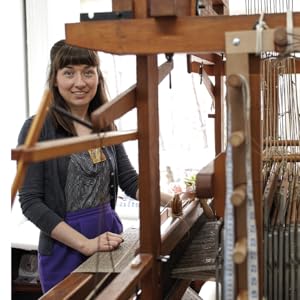From the Publisher
Includes 5 Loom Weaving Projects for Beginners. Customize Each With Your Own Unique Color Palettes and Patterns:





A Message to Readers from Fiona Daly…
Hello! My name is Fiona Daly and I’m a textile designer-maker and weaver, currently based in South London. My love of constructed textiles began at an early age, influenced by my grandmother, who worked as a lacemaker and ran her own craft shop in the West of Ireland.
In this book, you will be introduced to the basics of frame loom weaving—the simplest of weaving looms and therefore, the perfect one to begin weaving with—through a series of technique tutorials, together with complete project guides. Do not be discouraged if, at first, your weaving is loose with gaping holes, lacks uniform edges, is squint, or if little skips appear in the pattern. Learn to love these imperfections that represent your weaving journey, and know that their decrease maps your progression as a budding weaver. Relish in the knowledge that you are continuing a traditional craft that has been in continuous practice for almost 10,000 years and is intrinsic to the heritage of cultures the world over.
Add to Cart
Add to Cart
Add to Cart
Add to Cart
Customer Reviews
4.5 out of 5 stars
67
4.7 out of 5 stars
443
4.5 out of 5 stars
155
4.8 out of 5 stars
20
Price
$21.74$21.74 $17.98$17.98 $21.99$21.99 $18.06$18.06
Also Available from PA Press
Weaving Big on a Little Loom Wild Dyer Natural Palettes Modern Fabric
Publisher : Princeton Architectural Press; Illustrated edition (September 18, 2018)
Language : English
Paperback : 144 pages
ISBN-10 : 1616897120
ISBN-13 : 978-1616897123
Item Weight : 1.39 pounds
Dimensions : 8.38 x 0.63 x 10.63 inches
1. How do I choose the right type of yarn for my weaving project?
Answer: When choosing yarn for your weaving project, consider factors such as the gauge, type of fiber, and the desired outcome of your project. Some popular options include wool, cotton, and acrylic yarns.
2. Do I need any special tools or equipment to get started with weaving on a little loom?
Answer: While having a loom specifically designed for small-scale weaving is helpful, you can also use a simple DIY loom made from a frame or cardboard. Other essential tools include a weaving shuttle, a shed stick, and a weaving comb.
3. What are some basic weaving techniques that beginners should learn?
Answer: Some basic weaving techniques for beginners include tabby (plain) weave, twill weave, and soumak. These techniques will help you create different textures and patterns in your woven projects.
4. How can I troubleshoot common weaving mistakes, such as tension issues or uneven edges?
Answer: To address tension issues, make sure your warp threads are evenly spaced and adjust the tension as needed while weaving. To fix uneven edges, try adding more warp threads to create a straighter edge or use a weaving comb to help secure the weft threads in place.
5. Can I use my woven projects for practical purposes, such as making clothing or home decor items?
Answer: Yes, woven projects can be used for a variety of practical purposes, including making scarves, blankets, wall hangings, and even clothing items such as jackets or bags. Get creative and experiment with different materials and techniques to personalize your woven creations.














































Reviews
There are no reviews yet.